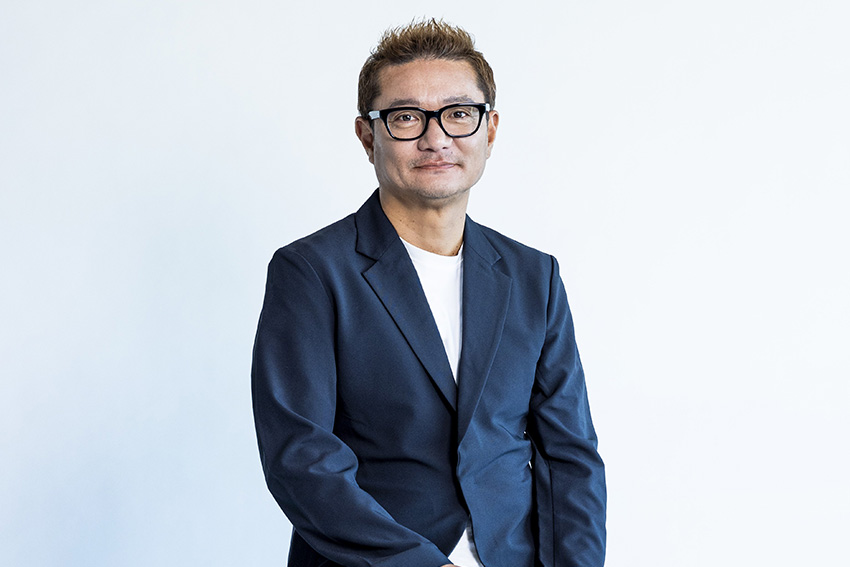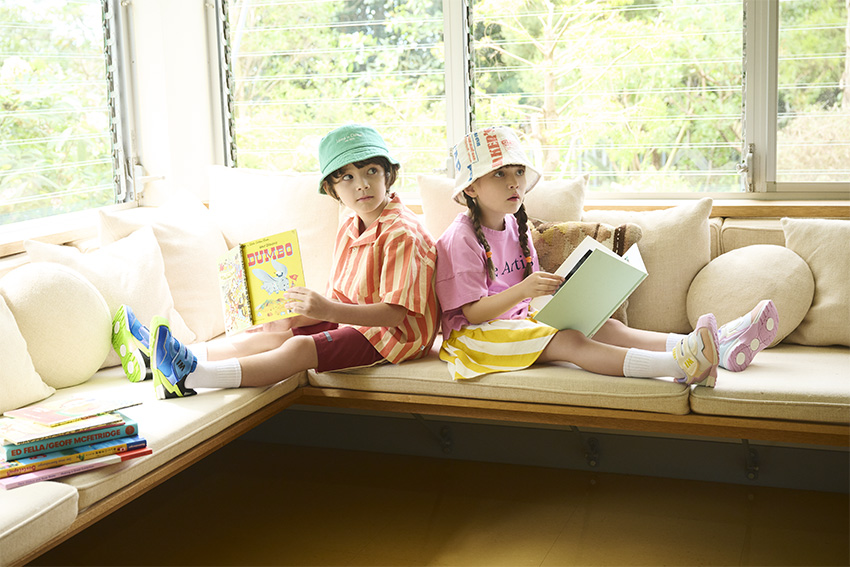Through ODM, OEM, and own brand products, Marubeni Consumer Brands is connecting with consumers through its lifestyle-related products.

Japan has a rich clothing culture deeply rooted in history, characterized by timeless designs that have evolved and improved over the years. Footwear has also been a significant part of this cultural heritage, playing a key role in shaping Japan's apparel identity. Today, the Japanese apparel industry is celebrated for its exceptional quality, as well as its seamless integration of innovative technologies and techniques. How would you define the uniqueness of Japanese fashion and apparel as a whole? In your opinion, what are its primary strengths?
When it comes to footwear, my background in the sneaker industry has given me insight into how the Japanese market has developed its unique designs, blending traditional elements like geta and zori shoes with Western influences. Japanese consumers are renowned for their emphasis on both quality and aesthetics, valuing not just appearance but also functionality. Footwear in Japan isn’t just about looking good; it must also meet high standards of comfort and practicality. This focus reflects Japan’s deep-rooted craftsmanship tradition, celebrated worldwide for its exceptional quality.
In recent years, with the increase in inbound tourism, Japanese designers have begun incorporating more distinctly Japanese design elements, further differentiating their footwear from European and other Asian styles. Personally, I believe the most significant difference between Japanese and Western footwear culture lies in how shoes are used. In Japan, it’s customary to remove shoes upon entering a home and put them back on when leaving, which requires footwear to be durable enough to withstand frequent on-and-off use. In contrast, in the West, people tend to wear the same pair of shoes throughout the day. Additionally, in Japan, it’s common to choose different shoes each time you leave home, adding another layer of variety to the culture.
Earlier, you mentioned the growing appreciation for Japanese quality among Westerners, a recognition that has only emerged relatively recently. Take Onitsuka Tiger, for instance—in Ginza, they operate two stores side by side: a made-in-Japan store and a standard store. What do you think is the biggest misconception about Japan’s fashion culture among those who haven’t had the chance to visit Japan?
I wouldn’t say there are necessarily misconceptions, but I do think the awareness of Japanese brands is much lower compared to Western brands. Of course, there are people who love Japan and visit specifically to purchase souvenirs to take back home. However, due to linguistic barriers, many Japanese companies remain hesitant to promote themselves internationally. As a result, information about Japanese brands isn’t as widespread abroad as it could be.
That said, people recognize the exceptional quality of Japanese products. For instance, it’s well-known that Brazilian soccer players often travel to Japan to purchase shoes. Despite this reputation for quality, many companies here are still reluctant to actively expand into overseas markets.
Would you say your company falls into the category of those that are hesitant to expand internationally? To what extent are you actively working to push your business into overseas markets?
Our business is still a work in progress, but we’re proud of the high-quality products we’ve developed and are eager to proactively take them overseas. I mentioned many Japanese companies are reluctant to expand into overseas markets, however some of Japanese eyewear maker are highly driven to expand their brands internationally. I hope more companies will follow these example and take the leap to showcase Japan’s exceptional quality to global markets.
Historically, Japan has had periods of isolation, such as during the Edo period, followed by the Meiji Restoration, when the country began opening up to the world. However, these days, I sense that Japan is reverting to a more inward-looking attitude. When I joined this company, I saw clear opportunities to compete and grow on a global scale, and I remain committed to pursuing that vision.
Marubeni Consumer Brands, previously known as Marubeni Footwear, was established in 1994 as a subsidiary of the Marubeni Trading Company. Since its inception, the company has focused on footwear, but the recent rebranding signals a strategic shift to broaden its scope beyond this category. The transformation aims to expand the consumer business, diversify the product lineup, and enhance the company’s presence in overseas markets. Could you elaborate on the motivation and rationale behind this rebranding decision?
Let me start by providing some background on our rebranding. Initially, we operated under the lifestyle division of our parent company, Marubeni, but we’ve since transitioned into the next-generation business development division. As a general trading company, Marubeni is involved in a number of businesses, the company has aimed to strengthen its D2C businesses, and we’ve become a key channel for connecting directly with consumers.
To support this expansion and diversify the Marubeni’s D2C channel, we decided to strengthen the merchandise and value of the brands so that they can be appreciated by the next generation, and changed our company name to Marubeni Consumer Brands. This new name reflects our broader vision to encompass not only footwear but also other apparel items. Through direct-run shops and e-commerce (EC) channels, we are diversifying our offerings and creating greater access for public consumers.
As part of your private label business, you’ve developed your own children’s shoe brand by leveraging expertise and industry collaborations. One standout feature of the IFME shoe brand is the Windlass Saucer insole, a specially designed insole that allows children’s toes to spread naturally upon ground contact, simulating the benefits of walking barefoot. Can you explain how the Windlass Saucer strengthens foot muscles and contributes to the development of healthy feet?
The launch of IFME took place 25 years ago and was the result of collaborations with various academic institutions. Our goal was to gain an in-depth understanding of children’s feet and the mechanics of walking, enabling us to design a shoe that supports the healthy growth of children’s feet. This initiative was driven by parents seeking footwear that would facilitate their children’s natural development. By working closely with research institutes, we developed IFME with the vision of providing the next generation with more comfortable, supportive shoes.
IFME shoes are designed to allow toes to stretch out naturally within the shoe, avoiding a tight fit. Stability and anti-slip properties are key features to ensure safety. Since these are children’s shoes, ease of use is also a priority, so we incorporated Velcro closures. The shoes are made with soft, flexible materials that provide excellent breathability, an essential factor for maintaining good foot hygiene. The breathable sole, featuring small holes, enhances airflow and allows the shoes to be machine-washed easily.
The design ensures the shoes are not overly narrow, enabling toes to move freely and grow healthily. This freedom promotes proper muscle development, particularly in the arch, supporting healthy foot growth. Additionally, the shoes help train children to maintain a natural and healthy walking posture. Essentially, IFME shoes are designed to let children explore the world comfortably and stress-free while fostering the growth and strengthening of their feet in a natural and healthy way.

Your company offers a variety of footwear series. Out of all the different series you provide, do you have a favorite or one that is particularly popular among customers?
Our IFME School Series is our best-seller, largely because children in nurseries and kindergartens wear shoes for extended periods. This creates a strong demand for durable and comfortable footwear. Additionally, children need sports shoes for outdoor activities like playing games and running around. To make them more appealing, we’ve incorporated fun motifs like trains and dinosaurs, which children love.
We also offer seasonal footwear, and one standout product has been our water shoes with excellent drainage function, which were a huge hit last summer. These shoes are perfect for children playing with water, as they keep feet dry and comfortable.
In Japan, there is a cultural tradition of changing shoes, with children typically having separate indoor and outdoor footwear. Conventionally, indoor shoes resemble slippers and are priced affordably. However, since these shoes are worn for long hours, they often lack proper hygiene. By introducing hygienic indoor footwear, we provide parents with peace of mind. This focus on quality and hygiene encourages parents to invest in higher-quality shoes that benefit their children far more than traditional indoor options.
We understand that your IFME shoes are sold internationally, including in markets like Taiwan. Could you share some of the successes you’ve experienced with selling IFME shoes abroad? Additionally, are there any new markets you’re particularly interested in expanding into?
Our overseas sales are currently in a trial phase, with initial markets including Taiwan. We’ve also begun selling in Dubai and have considering expanding into neighboring Asian countries such as China and Korea. At this stage, we’re focusing on refining our product lineup and strengthening communication with potential international partners.
That said, our primary focus remains on restructuring our domestic business. While we recognize the significant opportunities available in international markets, our current priority is to solidify and optimize our operations at home before fully expanding abroad.
In addition to your private brands, you also manage licensing and distribution for globally renowned brands like FILA and Rockport. What sets your company apart as an ideal partner for these brands, both as a licensor and as a domestic distributor in Japan?
As a subsidiary of Marubeni, a global trading firm, we benefit from extensive infrastructure, particularly in logistics and finance, which we leverage to support our operations. With over 30 years of experience as Marubeni Footwear, we’ve built a robust network of local retailers across Japan. In addition to wholesale operations, we also manage directly run stores and EC platforms, giving us multiple touchpoints with consumers.
Our ability to establish contracts with major brands like Merrell and FILA highlights the trust we’ve earned from both our partners and customers. With comprehensive expertise in domestic Japanese marketing and sales, we offer a full suite of services to partnering brands. This includes everything from planning and design to manufacturing and logistics, making us a reliable one-stop solution for brands looking to enter the Japanese market.
Are you calling out for further collaborations with international brands?
We are actively seeking new partners and emphasize our extensive experience in helping brands successfully enter the Japanese market. Entering this market involves significant investment and risk, and we aim to serve as a reliable bridge between international brands and Japanese consumers. However, we are selective in our approach; rather than simply expanding our lineup, we focus on finding unique, individual brands that complement our existing offerings without creating overlap.
One example of this is our distribution deal with Kizik, a brand specializing in hands-free shoes. This innovative approach is something we’re excited to introduce to the Japanese market. Hands-free shoes have become very big trend in the market. What sets Kizik apart is its distinct approach, which we aim to highlight locally. Each new brand we collaborate with brings a unique identity and value, ensuring there is no competition or overlap between our licensed brands.

Over the course of your career, you’ve worked with renowned brands like Nike, Crocs, and Skechers, and now you lead Marubeni Consumer Brands. You’ve mentioned that you joined the company in part because of its significant growth potential. Looking ahead, if we were to interview you again on your last day as president, what ambitions or dreams would you hope to have realized by that point?
To be honest, I truly love this company, so I don’t particularly like thinking about the day I’ll pass it on to the next generation. However, I do understand that it’s an inevitability. I spent 30 years working for an international subsidiary, bringing in exceptional products from overseas and introducing them to the Japanese market. A year ago, I joined Marubeni, a company that fascinated me with its unique blend of OEM manufacturing capabilities, private brands like IFME, and its role as a licensing agent for multiple international brands. It’s a business I’m deeply passionate about, and I’ll admit, I never really want to let it go.
Our private brands, particularly IFME, have been pivotal to our success, and strengthening these brands is a top priority. Making our newly launched brands successful is essential to achieving our broader mission, and from there, we aim to extend and expand our reach even further.
Our parent company, Marubeni, is also undergoing transformation. I feel privileged to be one of the first presidents of a subsidiary hired from outside the company, selected specifically for my expertise in footwear and the surrounding industry. Traditionally, Marubeni appoints leaders from within its group companies, so this role is a distinct honor for me. It has motivated me to make our business a resounding success and demonstrate that hiring external talent is a strategy that even traditional Japanese companies can embrace with confidence.
For more information, please visit their website at: https://www.marucob.com/
0 COMMENTS